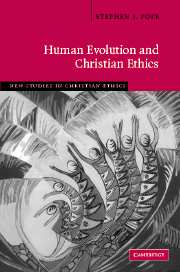Book contents
- Frontmatter
- Contents
- General editor's preface
- Acknowledgments
- Introduction
- Chapter 1 Evolution and religion
- Chapter 2 The indifference of Christian ethics to human evolution
- Chapter 3 Varieties of reductionism
- Chapter 4 Faith, creation, and evolution
- Chapter 5 Chance and purpose in evolution
- Chapter 6 Human nature and human flourishing
- Chapter 7 Freedom and responsibility
- Chapter 8 Human dignity and common descent
- Chapter 9 Christian love and evolutionary altruism
- Chapter 10 The natural roots of morality
- Chapter 11 Natural law in an evolutionary context
- Chapter 12 Sex, marriage, and family
- Bibliography
- Index of scriptural citations
- Index of names and subjects
Chapter 4 - Faith, creation, and evolution
Published online by Cambridge University Press: 26 June 2009
- Frontmatter
- Contents
- General editor's preface
- Acknowledgments
- Introduction
- Chapter 1 Evolution and religion
- Chapter 2 The indifference of Christian ethics to human evolution
- Chapter 3 Varieties of reductionism
- Chapter 4 Faith, creation, and evolution
- Chapter 5 Chance and purpose in evolution
- Chapter 6 Human nature and human flourishing
- Chapter 7 Freedom and responsibility
- Chapter 8 Human dignity and common descent
- Chapter 9 Christian love and evolutionary altruism
- Chapter 10 The natural roots of morality
- Chapter 11 Natural law in an evolutionary context
- Chapter 12 Sex, marriage, and family
- Bibliography
- Index of scriptural citations
- Index of names and subjects
Summary
This chapter examines three meanings of the term “evolution” and then turns to a more extended discussion of its theological interpretation. It concerns the theological perspective from within which Christian ethics responds to claims about human evolution.
THE MEANINGS OF EVOLUTION
The meanings of “evolution” include (1) the fact of evolution, (2) the scientific theory of evolution, and (3) ontological or other ideological extrapolations from evolution. This book will use the first two major senses of the term “evolution” and reject the third.
The National Academy of Science describes evolution as “the most important concept in modern biology, a concept essential to understanding key aspects of living things.” It is no longer possible, the National Academy points out, “to sustain scientifically the view that living beings did not evolve from earlier forms or that the human species was not produced by the same evolutionary mechanisms that apply to the rest of the living world.”
The term “evolution” is used in many ways. The most general use of the term is found in its etymological root, the Latin, evolutio, which means to unfold or develop from pre-existing structures. In this very broad sense we talk about the evolution of painting, the evolution of democracy, cosmic evolution, and so forth. The pre-Darwinian use of the term usually concerned a natural unfolding of steps in a prearranged sequence, the paradigm of which is embryonic development.
- Type
- Chapter
- Information
- Human Evolution and Christian Ethics , pp. 76 - 110Publisher: Cambridge University PressPrint publication year: 2007



